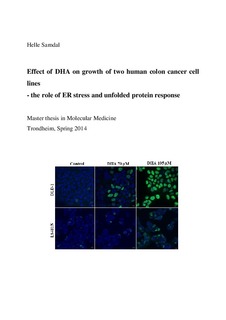| dc.description.abstract | Docosahexaenoic acid (DHA; 22:6n-3) is an essential omega-3 polyunsaturated fatty acid important to human health. DHA has been shown to have anticancer properties by reducing cancer cell proliferation, inducing apoptosis and differentiation, and inhibiting tumor cell invasion, angiogenesis and metastasis. Several mechanisms have been proposed to explain the effect of DHA in cancer. In colon cancer DHA may cause oxidative stress, changes in membrane composition or function, alterations in eicosanoid synthesis, signal transduction and regulation of gene expression. We have previously shown that DHA induces ER stress and growth arrest in some human cancer cell lines. The aim of this study was to investigate the molecular mechanisms involved in DHA anticancer properties, especially the role of endoplasmic reticulum (ER) stress, in human colon cancer cell lines with different DHA sensitivity.
Two colon cancer cell lines, grown in the same culture medium, were selected based on their differences in sensitivity towards DHA. Cell growth response after DHA treatment was measured by cell counting and MTT viability assay, showing that DLD-1 cells were sensitive to DHA (70 μM) with about 50 % growth inhibition after 48 h, while LS411N cells were considered insensitive with almost no growth inhibition at the same conditions. RT-PCR and western blotting were used to measure transcript and protein levels of ER stress and unfolded protein response (UPR) mediators, like activating transcription factor 4 (ATF4), which was found to be induced. Confocal imaging was done to investigate the localization of proteins of interest, like ATF4 that had an increased signal in the nucleus after DHA (70 and 105 μM) treatment. The role of ATF4 in DHA-mediated growth inhibition in DLD-1 cells was investigated using siRNA. DLD-1 cells transfected with siRNA against ATF4 showed a clear reduction in both ATF4 protein level and cell growth compared to cells transfected with non targeting siRNA. However, the ATF4 knockdown did not affect the DHA-mediated growth inhibition, suggesting that ATF4 alone is not responsible for the DHA-mediated effect. Preliminary results also indicated a possible increase in autophagic flux in DLD-1 cells after treatment with DHA (70 μM). In the LS411N cells, the UPR was slightly induced at later timepoints, while there was no change in autophagic flux. The role of lipid peroxidation was also studied by co-incubating both cell lines with vitamin E and DHA. Vitamin E did not conteract DHA-mediated growth inhibition in DLD-1 cells, indicating that lipid peroxidation is not the main cause of DHA-mediated cytotoxicity. | nb_NO |
